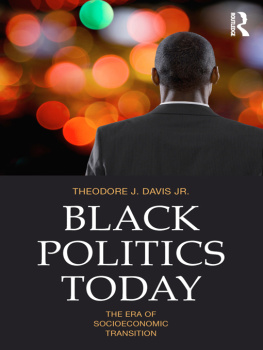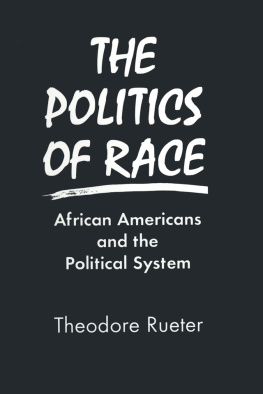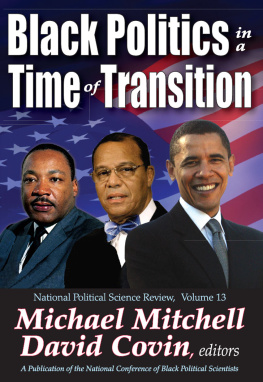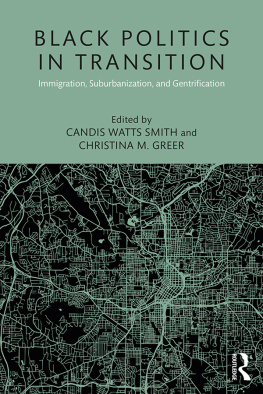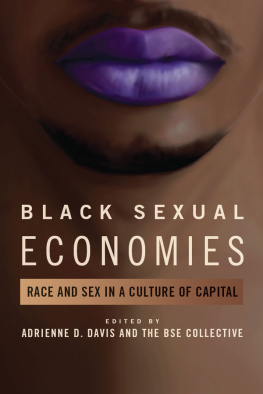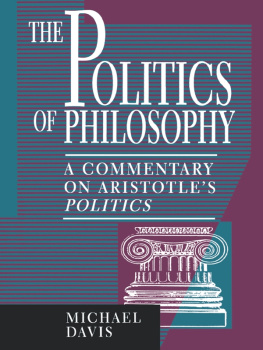BLACK POLITICS TODAY
The late 1980s ushered in a new era of black politics, the Socioeconomic Transition Era. Coming on the heels of the Protest Era and the Politics Era, the current stage is characterized by the emergence of a new black middle class that came of age after the civil rights struggle. Although class still isnt a strong factor in the external politics of the black community, it is increasingly a wedge issue in the communitys internal politics. Black politics today is increasingly less about the interests of the larger group and more about the interests of smaller subgroups within the community.
Theodore J. Davis Jr. argues that the greatest threat to the social and political cohesiveness of the black community may be the rise of a socially and economically privileged group among the ranks of black America. This rift has affected blacks ability to organize effectively and influence politics. Davis traces the changes in economic status, public opinion, political power and participation, and leadership over three generations of black politics. The result is an insightful analysis of black politics today.
Theodore J. Davis Jr. is Associate Professor in the Department of Political Science and International Relations at the University of Delaware. He has a joint appointment in the Black American Studies Program.
Identity Politics
Routledge Series on Identity Politics
Series Editor: Alvin B. Tillery, Jr., Rutgers University
Group identities have been an important part of political life in America since the founding of the republic. For most of this long history, the central challenge for activists, politicians, and scholars concerned with the quality of U.S. democracy was the struggle to bring the treatment of ethnic and racial minorities and women in line with the creedal values spelled out in the nations charters of freedom. We are now several decades from the key moments of the twentieth century when social movements fractured Americas system of ascriptive hierarchy. The gains from these movements have been substantial. Women now move freely in all realms of civil society, hold high elective offices, and constitute more than 50 percent of the workforce. Most African Americans have now attained middleclass status, work in integrated job sites, and live in suburbs. Finally, people of color from nations in Latin America, Asia, and the Caribbean now constitute the majority of Americas immigration pool.
In the midst of all of these positive changes, however, glaring inequalities between groups persist. Indeed, ethnic and racial minorities remain far more likely to be undereducated, unemployed, and incarcerated than their counterparts who identify as white. Similarly, both violence and workplace discrimination against women remain rampant in U.S. society. The Routledge series on identity politics features works that seek to understand the tension between the great strides our society has made in promoting equality between groups and the residual effects of the ascriptive hierarchies in which the old order was rooted.
Some of the core questions that the series will address are: how meaningful are the traditional ethnic, gender, racial, and sexual identities to our understanding of inequality in the present historical moment? Do these identities remain important bases for group mobilization in American politics? To what extent can we expect the state to continue to work for a more level playing field among groups?
Titles in the Series:
Black Politics Today
Theodore J. Davis Jr.
Forthcoming:
Jim Crow Citizenship: How Southern Progressives Remade Race,
Citizenship and Liberalism in America
Marek Steedman
First published 2012
by Routledge
711 Third Avenue, New York, NY 10017
Simultaneously published in the UK
by Routledge
2 Park Square, Milton Park, Abingdon, Oxon OX14 4RN
Routledge is an imprint of the Taylor & Francis Group, an informa business
2012 Taylor & Francis
The right of Theodore J. Davis Jr. to be identifi ed as author of this work has been
asserted by him/her in accordance with sections 77 and 78 of the Copyright,
Designs and Patents Act 1988.
All rights reserved. No part of this book may be reprinted or reproduced or
utilized in any form or by any electronic, mechanical, or other means, now
known or hereafter invented, including photocopying and recording, or in
any information storage or retrieval system, without permission in writing
from the publishers.
Trademark notice : Product or corporate names may be trademarks or registered
trademarks, and are used only for identifi cation and explanation without intent
to infringe.
Library of Congress Cataloging-in-Publication Data
Davis, Theodore James.
Black politics today: the era of socioeconomic transition / Theodore J. Davis Jr.
p. cm. (Routledge series on identity politics)
Includes bibliographical references and index.
1. African AmericansPolitics and government20th century. 2. African
AmericansPolitics and government21st century. 3. African Americans
Economic conditions20th century. 4. African AmericansEconomic
conditions21st century. 5. Middle class African Americans. 6. Social
classesUnited States. 7. Social mobilityUnited States. I. Title. II. Series.
E185.615D386 2011
323.1196'073dc22
2011009574
ISBN: 978-0-415-87914-9 (hbk)
ISBN: 978-0-415-87915-6 (pbk)
ISBN: 978-0-203-85225-5 (ebk)
Printed and bound in the United States of America on acid-free paper by
Walsworth Publishing Company, Marceline, MO
To my wife Juanda, and children Trey, Morgan, and Garrison.
This book is also dedicated to the memory of Rosa Dadee Davis, 1888 to 1988.

